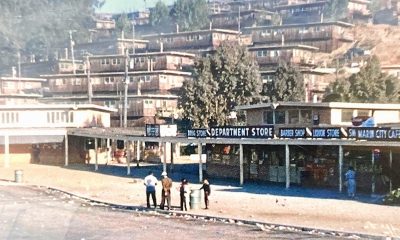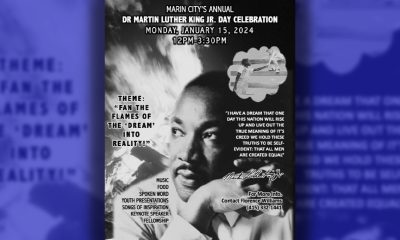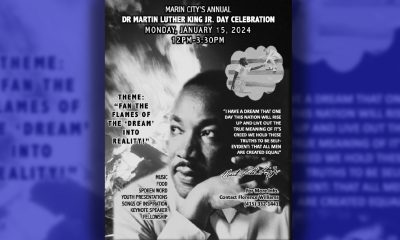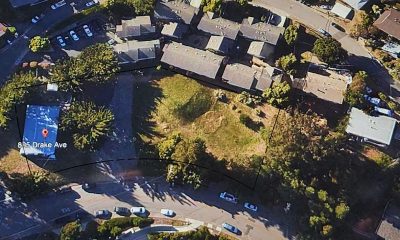Bay Area
Brian Colbert Seeks Re-Election for San Anselmo Town Council
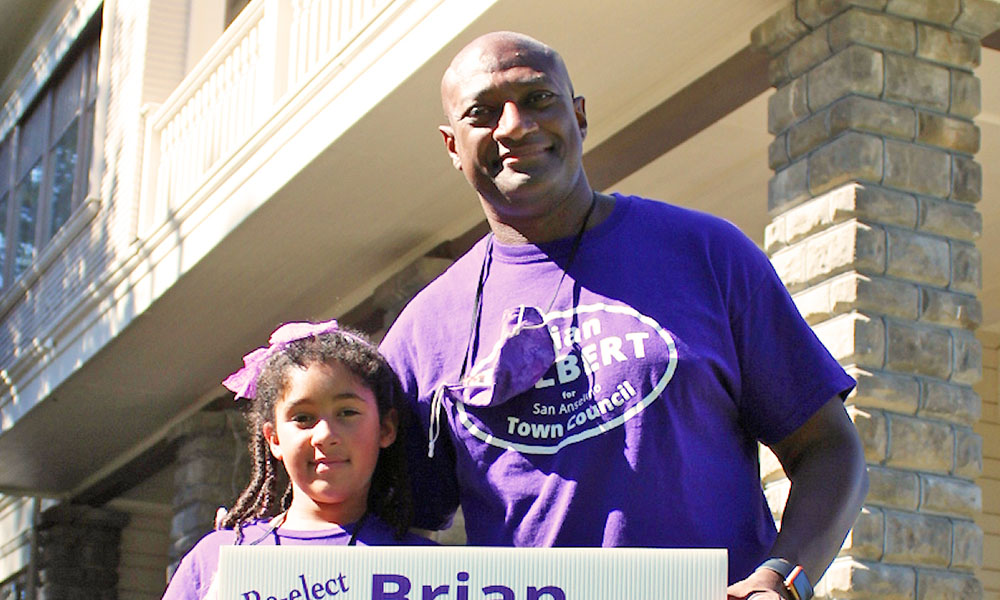
Brian Colbert, the vice mayor of San Anselmo, is seeking re-election to Town Council for 2020. Colbert previously served on the Town Council in 2017.
Colbert resides in San Anselmo with his wife, Nihal, and his daughter Leila, who is is a fifth-grader attending Wade Thomas Elementary School.
According to his election website, Colbert is seeking re-election to Town Council because he is accessible, has built relationships with his constituents and brought important and diverse perspectives and balance to the Council.
He will help San Anselmo address the many concerns brought on by COVID-19 by focusing on its community’s health, common sense oversight, fiscal planning and responsive local government.
He will focus on pedestrian and bike safety. Improving the downtown experience for everyone by helping restaurants thrive and continuing to build a compelling vision for San Anselmo’s historic downtown and its economic vibrancy by employing the principles of sustainability and bending the climate curve. He remains committed to open space, fire preparedness and strong local schools.
Colbert was recently interviewed for this article and said that while on the San Anselmo Economic Development Committee, he realized that flood mitigation is intrinsically tied to economic vitality. Downtown San Anselmo is susceptible to flooding. This is a real concern for small businesses there, as flooding would depress the level of investments on the part of landlords and businesses.

Brian Colbert and his daughter, Leila, (left) hold a campaign sign in front of the Robson-Harrington House in San Anselmo.
Colbert believes that the creation of a network of open spaces would really activate and bring economic vitality to downtown San Anselmo. This opportunity arose when Imagination Park was generously donated to the community by George Lucas. The County was also going to do a flood mitigation project in the heart of downtown. And Colbert thought the opportunity to continue creating the network of open space with a community project called Reimagine Creek Park should not be missed.
Open space is very important to Colbert. The parks are accessible to everyone in the community no matter their gender or color. Outdoor dining on streets closed to traffic on Friday, Saturday, and Sunday nights are helping many local restaurants survive the Pandemic. “We got so many of the restaurants investing in parks. They are not going back, they continue to embrace outdoor dining,” Colbert said.
People were also encouraged to walk to downtown, which also helps in the struggle against climate change.
Colbert sees that the changes have energized the community. “People are coming downtown. If you go down there in the evening, you see people doing gigantic bubble shows. People are taking over the street,” says Colbert. “What we did was to really focus on how can we help our small business right now. And how we can continue to deliver the groundwork for them to succeed, even during the COVID Pandemic.”
For more information on the re-election of Brian Colbert to San Anselmo Town Council in 2020, go to https://colbertforcouncil.com/
Activism
Oakland Post: Week of April 24 – 30, 2024
The printed Weekly Edition of the Oakland Post: Week of April 24 – 30, 2024

To enlarge your view of this issue, use the slider, magnifying glass icon or full page icon in the lower right corner of the browser window. ![]()
Alameda County
DA Pamela Price Stands by Mom Who Lost Son to Gun Violence in Oakland
Last week, The Post published a photo showing Alameda County District Attorney Pamela Price with Carol Jones, whose son, Patrick DeMarco Scott, was gunned down by an unknown assailant in 2018.

Publisher’s note: Last week, The Post published a photo showing Alameda County District Attorney Pamela Price with Carol Jones, whose son, Patrick DeMarco Scott, was gunned down by an unknown assailant in 2018. The photo was too small for readers to see where the women were and what they were doing. Here we show Price and Jones as they complete a walk in memory of Scott. For more information and to contribute, please contact Carol Jones at 510-978-5517 at morefoundation.help@gmail.com. Courtesy photo.
Bay Area
State Controller Malia Cohen Keynote Speaker at S.F. Wealth Conference
California State Controller Malia Cohen delivered the keynote speech to over 50 business women at the Black Wealth Brunch held on March 28 at the War Memorial and Performing Arts Center at 301 Van Ness Ave. in San Francisco. The Enterprising Women Networking SF Chapter of the American Business Women’s Association (ABWA) hosted the Green Room event to launch its platform designed to close the racial wealth gap in Black and Brown communities.

By Carla Thomas
California State Controller Malia Cohen delivered the keynote speech to over 50 business women at the Black Wealth Brunch held on March 28 at the War Memorial and Performing Arts Center at 301 Van Ness Ave. in San Francisco.
The Enterprising Women Networking SF Chapter of the American Business Women’s Association (ABWA) hosted the Green Room event to launch its platform designed to close the racial wealth gap in Black and Brown communities.
“Our goal is to educate Black and Brown families in the masses about financial wellness, wealth building, and how to protect and preserve wealth,” said ABWA San Francisco Chapter President LaRonda Smith.
ABWA’s mission is to bring together businesswomen of diverse occupations and provide opportunities for them to help themselves and others grow personally and professionally through leadership, education, networking support, and national recognition.
“This day is about recognizing influential women, hearing from an accomplished woman as our keynote speaker and allowing women to come together as powerful people,” said ABWA SF Chapter Vice President Velma Landers.
More than 60 attendees dined on the culinary delights of Chef Sharon Lee of The Spot catering, which included a full soul food brunch of skewered shrimp, chicken, blackened salmon, and mac and cheese.
Cohen discussed the many economic disparities women and people of color face. From pay equity to financial literacy, Cohen shared not only statistics, but was excited about a new solution in motion which entailed partnering with Californians for Financial Education.
“I want everyone to reach their full potential,” she said. “Just a few weeks ago in Sacramento, I partnered with an organization, Californians for Financial Education.
“We gathered 990 signatures and submitted it to the [California] Secretary of State to get an initiative on the ballot that guarantees personal finance courses for every public school kid in the state of California.
“Every California student deserves an equal opportunity to learn about filing taxes, interest rates, budgets, and understanding the impact of credit scores. The way we begin to do that is to teach it,” Cohen said.
By equipping students with information, Cohen hopes to close the financial wealth gap, and give everyone an opportunity to reach their full financial potential. “They have to first be equipped with the information and education is the key. Then all we need are opportunities to step into spaces and places of power.”
Cohen went on to share that in her own upbringing, she was not guided on financial principles that could jump start her finances. “Communities of color don’t have the same information and I don’t know about you, but I did not grow up listening to my parents discussing their assets, their investments, and diversifying their portfolio. This is the kind of nomenclature and language we are trying to introduce to our future generations so we can pivot from a life of poverty so we can pivot away and never return to poverty.”
Cohen urged audience members to pass the initiative on the November 2024 ballot.
“When we come together as women, uplift women, and support women, we all win. By networking and learning together, we can continue to build generational wealth,” said Landers. “Passing a powerful initiative will ensure the next generation of California students will be empowered to make more informed financial decisions, decisions that will last them a lifetime.”
-

 Activism4 weeks ago
Activism4 weeks agoOakland Post: Week of March 27 – April 2, 2024
-

 #NNPA BlackPress4 weeks ago
#NNPA BlackPress4 weeks agoBeloved Actor and Activist Louis Cameron Gossett Jr. Dies at 87
-

 Community1 week ago
Community1 week agoFinancial Assistance Bill for Descendants of Enslaved Persons to Help Them Purchase, Own, or Maintain a Home
-

 Activism3 weeks ago
Activism3 weeks agoOakland Post: Week of April 3 – 6, 2024
-

 Business2 weeks ago
Business2 weeks agoV.P. Kamala Harris: Americans With Criminal Records Will Soon Be Eligible for SBA Loans
-

 Activism2 weeks ago
Activism2 weeks agoOakland Post: Week of April 10 – 16, 2024
-

 Community2 weeks ago
Community2 weeks agoAG Bonta Says Oakland School Leaders Should Comply with State Laws to Avoid ‘Disparate Harm’ When Closing or Merging Schools
-

 Community7 days ago
Community7 days agoOakland WNBA Player to be Inducted Into Hall of Fame


